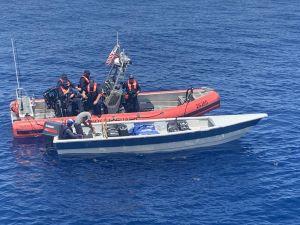Four federal legislators file a bill to strengthen the drug war in the Caribbean, a Hawaii bill to ease the way toward the therapeutic use of psilocybin and MDMA passes the Senate, and more.

Minnesota Marijuana Legalization Bill Wins More Committee Votes. The effort to legalize marijuana continued to bear fruit this week, with the House version of the bill, House File 100 being approved Monday by the House Human Services Policy Committee and the companion Senate bill being approved that sa me day by the Senate Transportation Committee. The actions mark the eighth approval by a House committee and the sixth by a Senate committee. With majorities in the House and Senate, as well as control of the governorship, the Democratic-Farmer-Labor Party is confident the bill will become law this year. It looks like there are only four committee votes to go before the bill heads for floor votes in the two chambers.
Opiates and Opioids
Idaho Bill Would Lower Heroin Penalties, Create Mandatory Minimums for Dealing Fentanyl. A bill before the legislature, House Bill 67, would raise quantity thresholds and reduce sentences for heroin dealing while creating a mandatory minimum sentence for fentanyl dealing. The amount of heroin required for a trafficking charge would jump from two grams to seven in the bottom tier and from 10 to 14 grams in the middle tier. Sentences for the top tier of heroin trafficking offenses would drop from 15 years to 10 and sentences for the middle tier would drop from 10 years to five. The bill would also make possession of more than seven grams of fentanyl a felony chargeable as "trafficking." Those caught with more than seven grams would face a three-year mandatory minimum, while those caught with more than 14 grams would face a five-year mandatory minimum, and those caught with more than 28 grams would face a 10-year mandatory minimum. The Idaho Chiefs of Police, Idaho Sheriffs Association and the Idaho Prosecuting Attorneys Association are all in favor of House Bill 67.
Psychedelics
Hawaii Psilocybin and MDMA Research Bill Wins Committee Vote. The Senate Health and Human Services Committee has approved Senate Bill 1531, which is aimed at promoting research into the therapeutic uses of MDMA, psilocybin, and other alternative mental health treatments. The bill would create a Beneficial Treatments Advisory Council that would review the scientific literature on using such substances for mental health treatment as well as exploring state and federal regulations on them. The council would be required to develop a "long-term strategic plan to ensure the availability of therapeutic psilocybin, psilocybin-based products, and [MDMA] that are safe, accessible, and affordable for adults twenty—one years of age or older." A companion bill in the House has yet to move.
Drug Policy
Old School Prohibitionist Bill to Fight Caribbean Drug Trafficking Filed in Congress. On Monday, three Republicans and one Democrat, Sens. Rick Scott (R-FL) and Alex Padilla (D-CA) and Reps. Jenniffer González-Colon (R-PR) and Stacey Plaskett (R-VI) introduced the Caribbean Border Counternarcotics Strategy Act , which aims "to stop the illegal trafficking of deadly drugs in the Caribbean, specifically between Puerto Rico, the US Virgin Islands and Florida." The bill would "ensure the Federal government has a strategy in place to prevent the flow of illicit drugs through the Caribbean region and into the United States by codifying in statute the requirement for ONDCP to issue a Caribbean Border Counternarcotics Strategy—just as Congress has codified the requirement for the Southwest Border and the Northern Border Counternarcotics Strategies." It would also clarify that US territories are included in the definition of "state" and "United States."
International
Colombian Government in Peace Talks with Leftist Rebels Who Demand "Alternative Drug Policies." The government of President Gustavo Petro and the country's largest remaining rebel group met in Mexico City to restart peace talks aimed at resolving a conflict dating back to the 1960s. The communist-inspired National Liberation Army (ELN) is calling for a "temporary, nationwide cease-fire" and that any agreement should include "an alternative anti-drug policy that is no longer based on repression and war." The ELN has a presence in some 200 Colombian township, mostly in areas of widespread coca cultivation and cocaine production. Like the larger FARC, which signed a peace agreement with the state in 2016, the ELN is involved in the drug trade and has replaced the FARC in many areas. But even though it is involved in the drug traffic, the ELN is adamant that it should not be treated like a drug trafficking organization but as a political force. This is the second round of talks since Petro took office last year. The first round did not achieve much.
This work by StoptheDrugWar.org is licensed under Creative Commons Attribution-ShareAlike 4.0 International
Add new comment